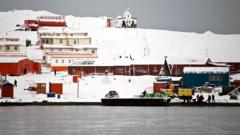The remains of Dennis Bell, who fell into a crevasse while working in Antarctica 65 years ago, have been found by a Polish research team. The discovery brings closure to his family and highlights the enduring legacy of explorers in extreme conditions.
Remains of Lost British Antarctic Explorer Found After 65 Years in Glacier

Remains of Lost British Antarctic Explorer Found After 65 Years in Glacier
Dennis "Tink" Bell, a British meteorologist who perished during a surveying expedition in Antarctica in 1959, has been identified after his bones were discovered in a melting glacier.
The bones of a British explorer, Dennis "Tink" Bell, who tragically lost his life in Antarctica during a surveying expedition in 1959, have been unearthed from a melting glacier by a Polish research team. Found in January, alongside personal items such as a wristwatch and a radio, this remarkable discovery has provided closure for his brother, David Bell.
Bell, just 25 years old at the time of his accident, was on a two-year assignment with what is now the British Antarctic Survey. He fell into a crevasse during a winter survey, and despite attempts to rescue him, he tragically perished. After a telegram informed David of his brother's death, it left a lasting impact on the family, who never received proper closure after the incident.
Professor Dame Jane Francis, director of the British Antarctic Survey, highlighted the contributions of Dennis Bell, stating that his memory had persevered throughout the years, especially among those who served alongside him. Records tell of his jovial personality and industrious nature at the Admiralty Bay station, where his responsibilities included operating weather balloons and caring for husky dogs.
The recent discovery was made by a Polish Antarctic expedition team near Ecology Glacier, not far from the Henryk Arctowski Polish Antarctic Station. In dangerously unstable conditions, the researchers retrieved multiple bones and personal artifacts, ensuring that Bell's remains were carefully marked and preserved.
David Bell, now 86 and residing in Australia, expressed his surprise and gratitude for the find, particularly emphasizing the emotional gravity of being able to finally bring his brother's remains home. The identification of his brother's remains has been a significant moment for David, who reflected on the bond they shared, while also acknowledging the somber nature of the occasion, as their parents did not live to see this day.
As climate change continues to reshape Antarctica, scientists will use this discovery as an opportunity to honor the contributions made by early explorers and promote the importance of scientific research in the region. David, planning a trip back to England with his sister to lay Dennis to rest, described the bittersweet excitement of finally finding his brother, marking an end to a long chapter of uncertainty.



















